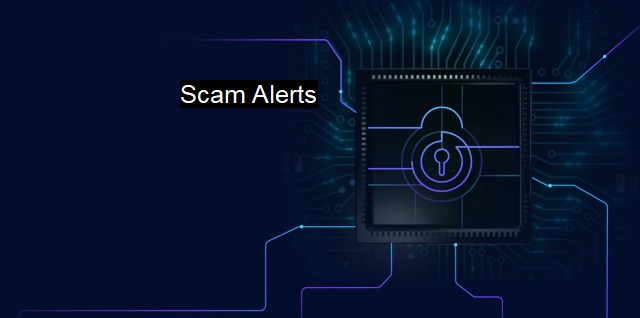What are Scam Alerts?
Scam Alerts and the Growing Importance of Cybersecurity in the Digital Age: Protecting Personal Data in a Landscape of Cyber Threats
Scam alerts refer to notifications or warnings about fraudulent schemes or deceptions designed to dupe unsuspecting individuals and dishonestly take their money or personal information. At its core, "scam alert" is a cybersecurity concept that alerts individuals about potential threats digitally looming that aim to harm one's privacy, steal assets, or infringe on personal data. It constitutes a significant feature within the broader framework of antivirus defenses, given its primary role in averting damaging repercussions upon potential victims.Scam alerts function as crucial defense mechanisms, inform about deceptive maneuvers online, and promote a safe cyber environment. Various fraudulent activities come under scam alerts' purview - phishing, spyware, malware, ransomware, fraudulent emails or websites, unsecure connections, false job offers, lottery scams, and impersonation scams, to name a few.
For many individuals, scam alerts are their first inkling of a potential attack, providing them with the foreknowledge to prevent breaches in their cybersecurity network, whether it be personal or professional. Cybersecurity has become a prime concern due to digital data proliferation. Scam alerts, hence, are not just important; they are essential in maintaining the integrity and confidentiality of one's information and systems online.
An understanding of scam alerts is important if one gains clarity about its relationship with antivirus software. Nowadays, cyber threats have become exceedingly sophisticated and diverse in their nature, easily bypassing previous, simple security systems. Antivirus software has evolved to match these threats equitably. A central feature of modern antivirus software is the ability to provide scam alerts, meant to detect scam attempts in advance, before they can inflict damage.
In principle, the antivirus software scans your device for already known threats using virus definitions. this is not enough to protect you from new, unknown threats which are not included in the virus definitions. To counter this, modern antivirus platforms leverage advanced heuristic techniques, enabling them to identify unfamiliar threats by their behavior.
Once they detect any digital activity or request from a suspicious entity, the antivirus defines it as a potential scam. Consequently, an alert is pushed out to the user, whether by way of pop-ups on their device, an email, or other notification preferences set by the user.
It is worth mentioning that these scam alerts are often categorized by their potential threat-level, giving users a better understanding of the severity of the risk involved. In real-time, the antivirus software actively prevents the scam from causing damage by either blocking the source (like the fake website page, unsecure link, or malicious app) or putting it into the virus chest (quarantine) until the user decides to delete it.
Beyond just your personal computer, scam alerts are becoming increasingly important in protecting various devices connected to the internet. As the Internet of Things proliferates, so should the application of scam alert-based antivirus software, protecting us from threats and raising our overall internet hygiene.
While cyber-threats become more varied, so must our methods of counteracting them. Scam alerts ideally ensure a baseline level of security that can prevent most malicious attacks or deceptions. Thus, being alerted to possible frauds sits as a much-needed prevention tool in an ever-growing and ever-complicating digital era. It is hence an essential feature aimed at securing one's privacy while promoting a safe and secure digital environment for every netizen.

Scam Alerts FAQs
What are scam alerts?
Scam alerts are warning messages or notifications that are issued to alert individuals about some type of fraudulent activity that is currently taking place or has happened in the past. These alerts can be related to various areas such as cybersecurity, antivirus, online phishing scams, fraudulent emails, and other related fraudulent activities.How do scam alerts help individuals stay protected from cyber frauds?
Scam alerts help individuals to stay vigilant and aware of the latest online scams and frauds. These alerts provide information regarding the types of scams that are currently active, the tactics being used by scammers, and tips on how to avoid becoming a victim to these scams. By staying informed and updated through these alerts, individuals can take proactive steps to protect themselves and their valuable information.Where can I find scam alerts?
You can find scam alerts through various channels such as antivirus software, cybersecurity websites, government agencies, and other online sources. These alerts can be delivered through email notifications, pop-up warnings, or social media posts. Ensure that the sources you are obtaining the alerts from are authentic and legitimate to avoid falling victim to additional fraudulent activities.What should I do if I receive a scam alert?
If you receive a scam alert, take immediate action to protect yourself. First, ensure that the alert is legitimate by checking the source of the notification. If the alert is related to an email, do not click any links or download any attachments. If the alert is related to a website, do not input any personal information or log in credentials. Follow any instructions provided in the alert to stay safe and secure, and report any fraudulent activities to the relevant authorities.| | A | | | B | | | C | | | D | | | E | | | F | | | G | | | H | | | I | | | J | | | K | | | L | | | M | |
| | N | | | O | | | P | | | Q | | | R | | | S | | | T | | | U | | | V | | | W | | | X | | | Y | | | Z | |
| | 1 | | | 2 | | | 3 | | | 4 | | | 7 | | | 8 | | |||||||